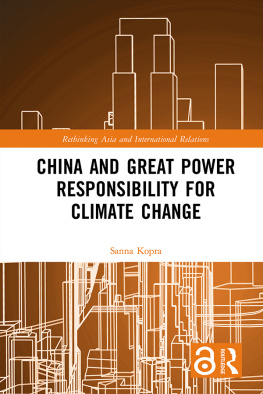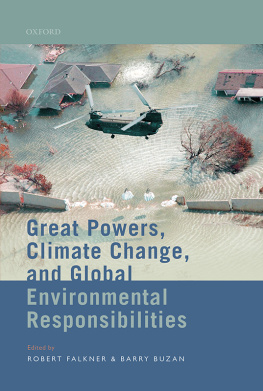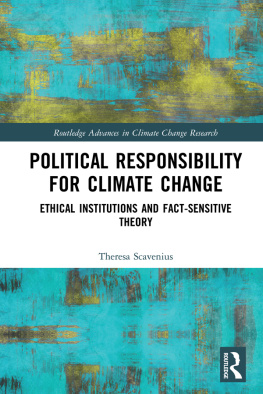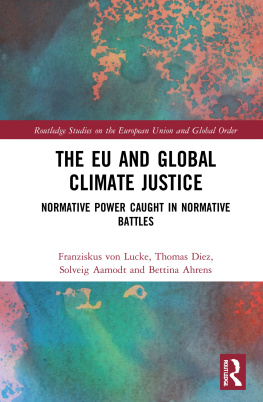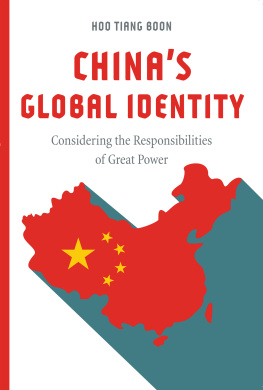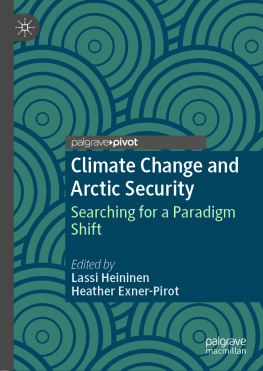China and Great Power Responsibility for Climate Change
As American leadership over climate change declines, China has begun to identify itself as a great power by formulating ambitious climate policies.
Based on the premise that great powers have unique responsibilities, this book explores how Chinas rise to great power status transforms notions of great power responsibility in general and international climate politics in particular. The author looks empirically at the Chinese party-states conceptions of state responsibility, discusses the influence of those notions on Chinas role in international climate politics, and considers both how China will act out its climate responsibility in the future and the broader implications of these actions. Alongside the argument that the international norm of climate responsibility is an emerging attribute of great power responsibility, Kopra develops a normative framework of great power responsibility to shed new light on the transformations Chinas rise will yield and the kind of great power China will prove to be.
The book will be of interest to students and scholars of international relations, China studies, foreign policy studies, international organizations, international ethics and environmental politics.
Sanna Kopra is a post-doctoral researcher at the Aleksanteri Institute, University of Helsinki and the Arctic Centre, University of Lapland, Finland.
Rethinking Asia and International Relations
Series Editor Emilian Kavalski, Australian Catholic University (Sydney)
This series seeks to provide thoughtful consideration both of the growing prominence of Asian actors on the global stage and the changes in the study and practice of world affairs that they provoke. It intends to offer a comprehensive parallel assessment of the full spectrum of Asian states, organisations, and regions and their impact on the dynamics of global politics.
The series seeks to encourage conversation on:
what rules, norms, and strategic cultures are likely to dominate international life in the Asian Century;
how will global problems be reframed and addressed by a rising Asia;
which institutions, actors, and states are likely to provide leadership during such shifts to the East;
whether there is something distinctly Asian about the emerging patterns of global politics.
Such comprehensive engagement not only aims to offer a critical assessment of the actual and prospective roles of Asian actors, but also seeks to rethink the concepts, practices, and frameworks of analysis of world politics.
This series invites proposals for interdisciplinary research monographs undertaking comparative studies of Asian actors and their impact on the current patterns and likely future trajectories of international relations. Furthermore, it offers a platform for pioneering explorations of the ongoing transformations in global politics as a result of Asias increasing centrality to the patterns and practices of world affairs.
For more information about this series, please visit: https://www.routledge.com/Rethinking-Asia-and-International-Relations/book-series/ASHSER1384
Advaita as a Global International Relations
Deepshikha Shahi
China and Great Power Responsibility for Climate Change
Sanna Kopra
First published 2019
by Routledge
2 Park Square, Milton Park, Abingdon, Oxon OX14 4RN
and by Routledge
711 Third Avenue, New York, NY 10017
Routledge is an imprint of the Taylor & Francis Group, an informa business
2019 Sanna Kopra
The right of Sanna Kopra to be identified as author of this work has been asserted by her in accordance with sections 77 and 78 of the Copyright, Designs and Patents Act 1988.
The Open Access version of this book, available at www.taylorfrancis.com, has been made available under a Creative Commons Attribution-Non Commercial-No Derivatives 4.0 license.
Trademark notice: Product or corporate names may be trademarks or registered trademarks, and are used only for identification and explanation without intent to infringe.
British Library Cataloguing in Publication Data
A catalogue record for this book is available from the British Library
Library of Congress Cataloging in Publication Data
A catalog record has been requested for this book
ISBN: 9781138557604 (hbk)
ISBN: 9781315151113 (ebk)
For Aino and Senni
This book extends a doctoral dissertation that I defended in November 2016 at the University of Tampere, Finland. The assistance of my supervisors Eero Palmujoki and Lassi Heininen was essential to the completion of my dissertation, and I am eternally grateful for their direction, encouragement and support over the years. I am exceedingly grateful to Cornelia Navari as well, who not only accepted the invitation to serve as my opponent at the public defence of my dissertation but has also provided me with valuable guidance ever since. The book has greatly benefitted from the insightful comments of Cornelia Navari and Tonny Brems Knudsen on my chapter in International Organization in the Anarchical Society: The Institutional Structure of World Order, edited by them. My thanks also go to Liisa Kauppila, who has taught me a great deal about China and indulged me with many interesting conversations that helped me progress my work. Moreover, I am deeply grateful for the useful comments offered by two anonymous reviewers of my book proposal.
I would additionally like to acknowledge the financial support of the Joel Toivola Foundation that made it possible to rework my dissertation into this book. I also thank Veli-Pekka Tynkkynen for recruiting me to join the Assessing Intermediary Expertise in Cross-Border Arctic Energy Development project funded by the Academy of Finland (project no. 285959), which in due course enabled me to finish the book.
Last, my greatest thanks go to my husband, Juha, who has always stood by me and never questioned my choices, even if they went against his hopes. Juha: no words are enough to express what your love, support and patience have meant and continue to mean to me.
I dedicate this book to my two daughters, Aino and Senni, who mean the world to me. For your sake and for the sake of your entire generation I truly wish that the worlds great powers live up to their great power climate responsibility, inspire the whole world to fulfil their climate responsibility and to do so now.
Numminen, 8 March 2018
Sanna Kopra
There has been much talk about responsibility in world politics in recent years. In particular, the allocation of responsibility has been central to international climate negotiations, in which the principle of common but differentiated responsibilities has been agreed upon as a guiding principle. As these negotiations have made clear, however, responsibility is a remarkably vague concept, and its meaning in world politics in particular remains altogether uncertain. In negotiations with stakes as high as Earths climate, a few questions about responsibility thus need to be asked. For example, what is responsibility? When it comes to states, for what are they responsible and to whom? On the international stage, who judges responsibility, its assignment and its fulfilment? What do states need to do, or refrain from doing, in order to be viewed as responsible members of international society?
Responsibility has become an especially popular word in speculations about whether the so-called rise of China will pose a risk or an opportunity for the world. Likewise, an extensive body of academic literature has discussed whether China is, or will become, a responsible player in world politics (e.g. Chan 2006; Clark 2014; Deng 2008; Gill 2007; Gill et al. 2007; Patrick 2010; Shambaugh 2013; Xia 2001; Zhang & Austin 2001). Political debate over Chinas responsibility has been particularly heated in international climate negotiations, where China has been accused of being irresponsible and blocking progress for years on end (e.g. Lynas 2009; Porter 2009; Vidal 2009). From an adjacent angle, academic research on Chinas climate policy has focused on the countrys contributions to international climate negotiations, its climate policy decision-making process, its national interests in climate negotiations and its responsibility for causing climate change (e.g. Chen, G. 2009; Chen 2012; Ella 2016; Gong 2011; Harris 2011; Harris & Yu 2009; Marks 2010; Moore 2011). In both contexts, Chinas policies have largely been evaluated with a rubric of Western interests and expectations, and too little attention has been paid to Chinas own notions of responsibility in international climate politics, particularly on what ethical basis the Chinese government considers itself to be responsible, for what, to whom and, above all, why (cf. Chen, Z. 2009; Foot 2001; Jin 2011; Jones 2014; Scott 2010; Yeophantong 2013; Zhang & Austin 2001).

